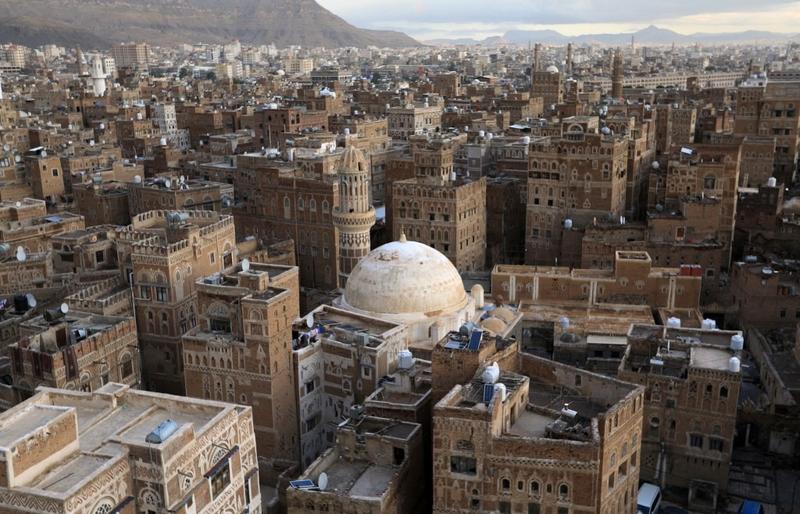 This April 21, 2020, photo shows a general view of the historical quarter of the Yemeni capital Sanaa, which is currently listed as one of the world heritage sites by the United Nations Educational, Scientific and Cultural Organisation (UNESCO). (MOHAMMED HUWAIS / AFP)
This April 21, 2020, photo shows a general view of the historical quarter of the Yemeni capital Sanaa, which is currently listed as one of the world heritage sites by the United Nations Educational, Scientific and Cultural Organisation (UNESCO). (MOHAMMED HUWAIS / AFP)
Newly appointed United Nations envoy to Yemen Hans Grundberg may have a shot at restoring peace in the country – if he zeroes in on its political crisis rather than the humanitarian aspects, experts say.
The civil war in Yemen broke out in 2014 when the Houthis seized the capital Sanaa, forcing out the internationally recognized government of President Abd-Rabbu Mansour Hadi
Grundberg, who served as ambassador of the European Union to Yemen in 2019, succeeded Martin Griffiths of the United Kingdom as the fourth envoy since Aug 6. The Gulf Cooperation Council has welcomed Grundberg's appointment, but the Houthi rebels, which mostly control north Yemen, rejected possible talks until restrictions against their areas are lifted.
Oman-based Houthi negotiator Mohammed Abdulsalam tweeted that there was no use having any dialogue before airports and ports are opened as a humanitarian necessity and priority.
But Mohammed Alragawi, a research fellow at Yemeni think tank Abaad Studies and Research Center, said solving the political unrest will lead to reducing the effects on the other aspects of the crisis and eventually end the humanitarian need.
ALSO READ: UN special envoy calls for ending war in Yemen without delay
Yemen has been divided into factions. Apart from the Houthis, areas are also being controlled by the Southern Transitional Council and the anti-Houthi forces opposed to the government, which are both backed by the United Arab Emirates, Yemeni government forces, Saudi-backed forces and the Al-Qaeda.
The civil war in Yemen broke out in 2014 when the Houthis seized the capital Sanaa, forcing out the internationally recognized government of President Abd-Rabbu Mansour Hadi. The following year, a US-backed Saudi-led coalition intervened to restore Hadi's government and launched a campaign of economic isolation and air strikes against the Houthis.
"Mr Grundberg will be able to make a difference if he makes use of the lesson learned from previous UN envoys to Yemen. He should not repeat Griffiths' mistake of dividing the crisis into small components, but rather look at the crisis as one block and find a comprehensive and sustainable solution," Alragawi said.
Saudi Arabia's Foreign Minister Faisal bin Farhan in March announced an initiative to end the fighting between Houthi rebels and the Riyadh-backed government under the supervision of the UN.
The proposal involved partially opening the airport in the Yemeni capital Sanaa and reviving a revenue-sharing mechanism between the Houthis and the government. But this was rejected by the rebels, which insisted on an end to the blockade first.
Abdulghani Al-Iryani, who previously worked with the UN in the Office of the Special Envoy of the Secretary-General for Yemen and the UN Development Programme mission in Hodeidah in Yemen, believes Grundberg has a better chance at bringing about change, given his experience as the EU ambassador to the country.
Grundberg, he said, should remove the UN Security Council resolutions, which have served as an obstacle to any serious negotiations. The second step would be to include Yemeni parties that have been marginalized.
"The tendency of international approach in the past was to reward warlords by saying that the discussions will only be between all those who are fighting," said Al-Iryani, who is also a senior researcher at the Yemen-based Sanaa Center for Strategic Studies. “So (Grundberg) needs to broaden the dialogue, include political and civil forces, civil actors."
Mehmet Rakipoglu, a research assistant at Sakarya University Middle East Institute, said a difficult task awaits Grundberg considering the UN's previous attempts have also failed. The EU, he said, can be expected to play a more active role in the Yemen crisis.
"It is possible to evaluate this development within the framework of the policy of seeking solutions to current problems in cooperation with international organizations by re-strengthening the relations of the US with institutions such as NATO, EU and UN that were damaged by Trump but now these institutions are preferred again by (US President) Joe Biden," said Rakipoglu, who is also a non-resident fellow at Center for Middle Eastern Studies or ORSAM.
The UN has referred to Yemen as "the largest humanitarian crisis in the world" where an estimated 21 million out of some 29 million people are in need of humanitarian assistance, including 11 million children. The situation has also been exacerbated by the COVID-19 pandemic.
READ MORE: Mountain battles signal path to Yemen peace runs via more war
The United States announced it would extend $165 million in additional humanitarian aid to Yemen amid concerns about the conflict's humanitarian toll. "Politically, this extra aid shows Biden administration's firm determination to have more influence in the crisis in Yemen after assigning its own special envoy to Yemen in February 2021," said Abaad's Alragawi, adding that the new fund comes in a time of increasing humanitarian need in Yemen as fighting continues and more internally displaced and vulnerable people need more assistance.
ORSAM's Rakipoglu said Saudi Arabia, on the basis of security concerns, has resorted to other means within itself besides supporting regional and international initiatives for a political solution and a comprehensive ceasefire.
"For me, the best and fastest solution for Yemen is (its) political (solution). (The) Biden administration, Saudi Arabia, and Iran must cooperate with local and regional actors to take responsibility and end the war," Rakipoglu said.


